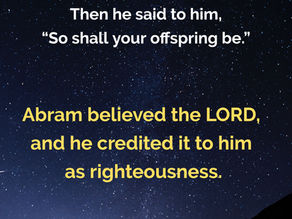Psalm 5:1-7 - The Loving God Who Hates
- Chad Werkhoven
- Jun 10, 2024
- 4 min read
Push back on your tendency to make God something He's not.
Psalm 5:1–7 (NIV)
For the director of music. For pipes. A psalm of David.
1 Listen to my words, Lord,
consider my lament.
2 Hear my cry for help,
my King and my God,
for to you I pray.
3 In the morning, Lord, you hear my voice;
in the morning I lay my requests before you
and wait expectantly.
4 For you are not a God who is pleased with wickedness;
with you, evil people are not welcome.
5 The arrogant cannot stand
in your presence.
You hate all who do wrong;
6 you destroy those who tell lies.
The bloodthirsty and deceitful
you, Lord, detest.
7 But I, by your great love,
can come into your house;
in reverence I bow down
toward your holy temple.
Listen to passage & devotional:
Belgic Confession of Faith, Article 20: The Justice and Mercy of God in Christ
We believe that God—
who is perfectly merciful
and also very just—
sent his Son to assume the nature
in which the disobedience had been committed,
in order to bear in it the punishment of sin
by his most bitter passion and death.
So God made known his justice toward his Son,
who was charged with our sin,
and he poured out his goodness and mercy on us,
who are guilty and worthy of damnation,
giving to us his Son to die,
by a most perfect love,
and raising him to life
for our justification,
in order that by him
we might have immortality
and eternal life.
Summary
David throws our Triple-A prayer pattern right out the window. We follow the pattern set by Jesus when He teaches how to pray through what's come to be known as the Lord's Prayer. He begins by Acknowledging who God is: Our Father, in heaven, who is holy. Next He Aligns our lives with God's will: May your will be done on earth as it is in heaven, and lead us not into temptation. It's not until these first two steps have oriented the person praying towards God that he can Ask for what he needs.
But this model isn't set in stone. So many Biblical prayers follow it, but not all of them. David here begins his prayer with a demand: Listen to my words & consider my lament! What an insight we're given here on the relationship you have with your Father, that you can boldly approach His throne of grace without even knocking on the door, so to speak!
Yet one thing your prayers - and not just our prayers, but every aspect of your life - must have is a respect for the tension that defines God's character. Tension here doesn't mean that God exists in stress, but rather that there are aspects of Him that seem mutually exclusive to us.
David does go on to Acknowledge who God is in this prayer: God hates all who do wrong, and with Him, evil people are not welcome (v4-5). But paradoxically, David, like us, can come into God's house by His great love (his ḥěʹ·sěḏ = covenant faithfulness). That's a tremendous example of the tension present in God's character: the God who hates evil is the same God who defines love!
(Also, for the record, David goes on in Psalm 5 to Align his life with God's will in a big way as well. So technically Psalm 5 is a AAA prayer!)
Dig Deeper
Maybe you thought you clicked on the wrong post as you read the portion of our Confession today, because it seems really familiar. That's because we keep reading the very same words as we work through our Confession: God is both merciful and just at the same time.
It's interesting to see that even 463 years ago when the Belgic Confession was written, this concept of God's simultaneous mercy and justice needed to be repeated often. The more things change, the more they stay the same! Our human nature wants to understand God as being one way or the other: either merciful or just, but not both.
Some people view God as nothing but a wrath filled ogre, who delights in smiting sinners just like it says in v6: God "destroys those who tell lies." Other people want to cling only to God's mercy, thinking that somehow the mean and vengeful God of justice we read about in the Old Testament has been replaced with the kind and forgiving Father we meet in the New Testament who doesn't seem to get too riled up about our sin.
So you can see that it's so critically important for you to hold on tightly to God's paradoxical nature - He is both just and merciful - that along with the rest of the Reformed church, you need lots of regular reminders. As we'll see for the remainder of this week, the reason God can be both is because justice has been met in Christ so that He can pour His mercy out on you.
ACKNOWLEDGE WHO GOD IS: Our Father, who hates those who do wrong but shows ḥěʹ·sěḏ love to His people.
ALIGN YOUR LIFE WITH GOD'S WILL: Pray that you will live in a way that's metaphorically bowed down in reverence towards God's holy temple (v7);
ASK GOD FOR WHAT YOU NEED:
Read the New Testament in a year! Today: Ephesians 4




















Comments